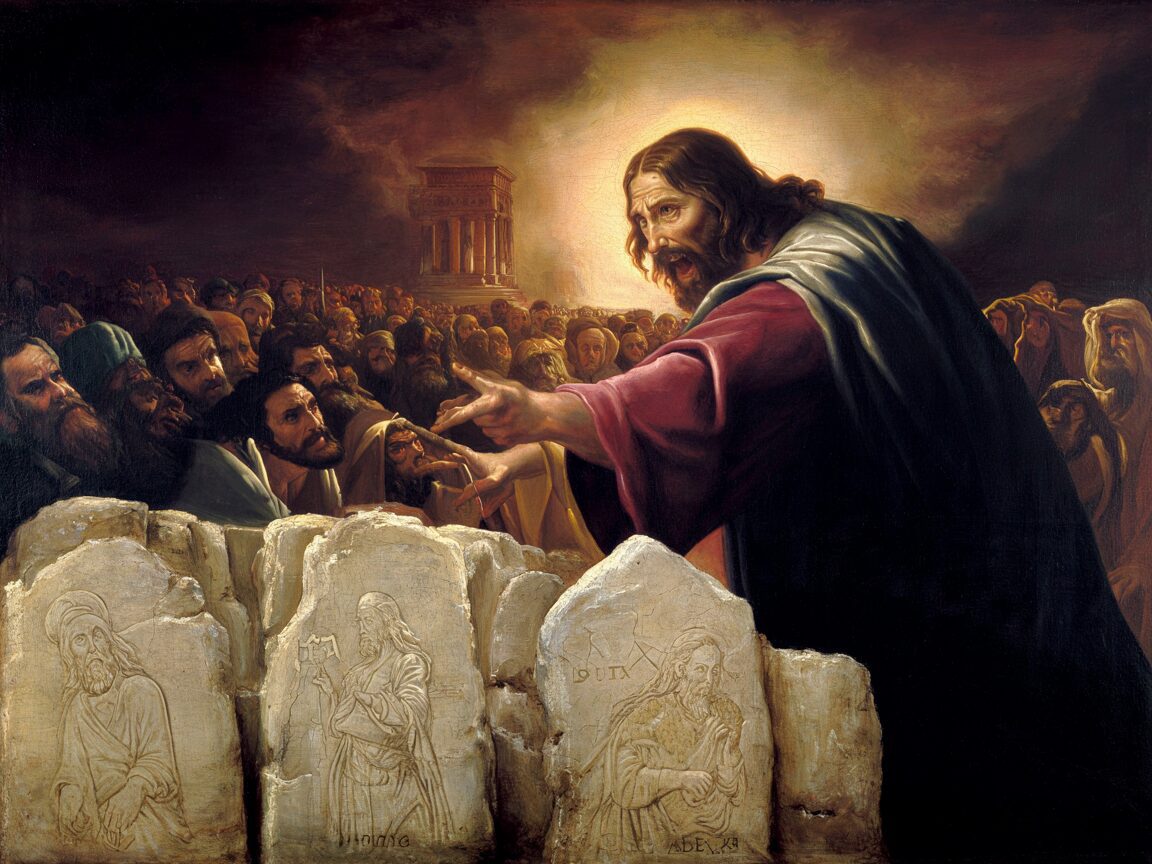Gospel of Jesus Christ according to Saint Luke
At that time, Jesus said:
"What a misfortune for you,
because you build the tombs of the prophets,
while your fathers killed them.
So you testify
that you approve of the acts of your fathers,
since they themselves killed the prophets,
and you build their tombs.
Therefore the Wisdom of God herself said:
I will send them prophets and apostles;
among them they will kill and persecute.
So this generation will have to give an account
of the blood of all the prophets
which has been poured out since the foundation of the world,
from the blood of Abel to the blood of Zechariah,
who perished between the altar and the sanctuary.
Yes, I tell you:
This generation will be held accountable.
Woe to you, doctors of the Law,
because you have taken away the key of knowledge;
you yourselves did not enter,
and those who wanted to enter,
you prevented them from doing so."
When Jesus left the house,
the scribes and the Pharisees
began to attack him
and to harass him with questions;
They set traps for him to track down
every word he says.
– Let us acclaim the Word of God.
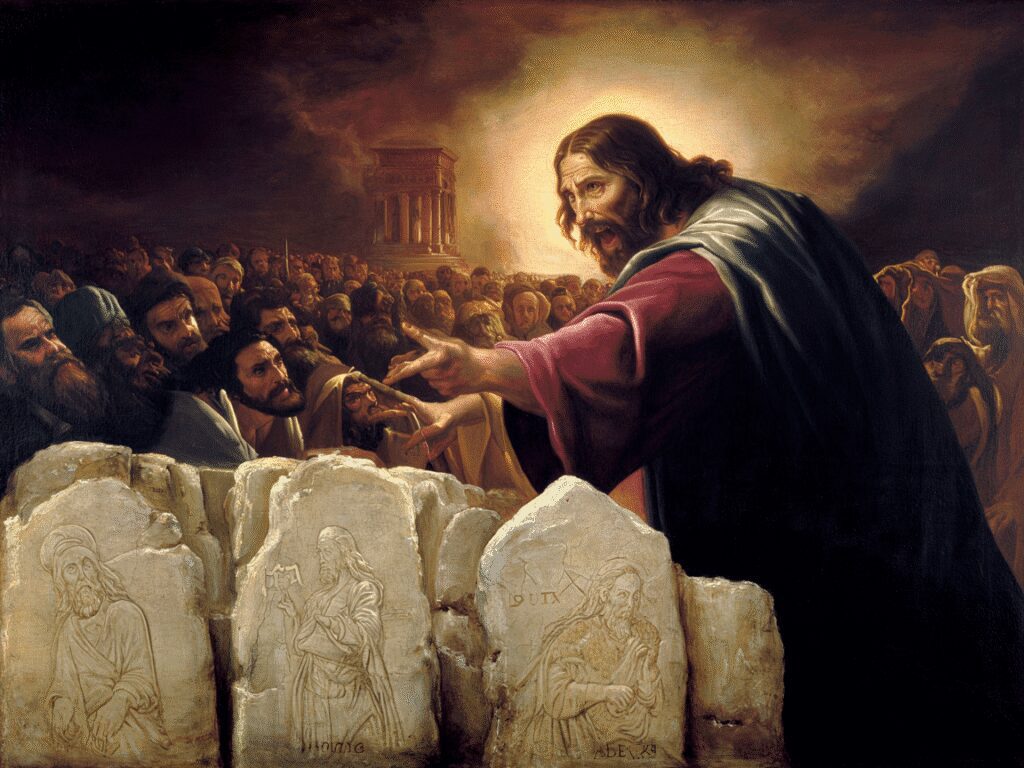
Welcoming the wounded prophecy, entering through the key of life
Luke 11:47-54 and John 14:6 to transform our memories, our institutions and our daily choices towards a living fidelity
Who benefits from the memory of the prophets if it does not open the door to living knowledge? By denouncing magnificently built tombs but closed hearts, Jesus links historical responsibility to access to the truth. This article is addressed to those who wish to combine faith, discernment, and action—catechists, leaders of charities, researchers, families—to move from venerating the past to courageously imitating it today. The common thread: welcoming Christ, the "Way, the Truth, and the Life" as the key that transforms our wounded memories into promises of shared life.
- The biblical context: from “Abel to Zechariah”, the chain of responsibility.
- The central idea: the key to knowledge is a person and a passage.
- Three axes: accurate memory, humble hermeneutics, prophetic imitation.
- Applications by spheres of life and prayer track to implement.
- Echoes of Tradition, contemporary challenges and a reusable practical sheet.
Context
In the Gospel according to Luke, Jesus addresses scholars of the Law and Pharisees who, while honoring the prophets with tombs, keep their distance from their living word. The scene is part of a series of "misfortunes" that reveal a discrepancy: the veneer of piety covers the fear of being disturbed. Jesus dares to name the blind spot: "You have taken away the key to knowledge" and you prevent those who wanted to enter from entering. The purpose is at once historical, symbolic, and spiritual.
Historical, because Jesus links "the blood of Abel"—the first innocent killed in Genesis—to "that of Zechariah," symbolizing the mistreated prophetic line. This formula embraces the whole of Scripture (from the first to the last victim mentioned), as if to say: it is the entire history of the relationships between God and his people that is at stake in our way of receiving the truth.
Symbolic, because building tombs can mean sanctifying the past to neutralize its sharpness. We pay homage, but we avoid the concrete call to conversion. We channel memory into stone, instead of opening the door to the heart.
Spiritual, finally, because Jesus, in today's Alleluia, presents himself as "the Way, the Truth and the Life" (Jn 14:6). The key to knowledge is not primarily a study technique or an interpretive grid: it is a person, a passage to be crossed with him. Authentic knowledge is not cumulative but paschal: it opens with a Passover, a consent to leave our securities.
The word that decides
“You have taken away the key of knowledge; you yourselves did not enter in, and those who were entering you hindered.”
The tension tightens: Jesus' interlocutors go on the offensive, watching for the crack to "hunt down his every word." The rejection of the truth is not neutral: it becomes tactical, opposed to the simplicity of truth. This sheds light on our current contexts: institutions, networks, families where religious memory is honored, but where the transition to a transformative practice remains blocked.
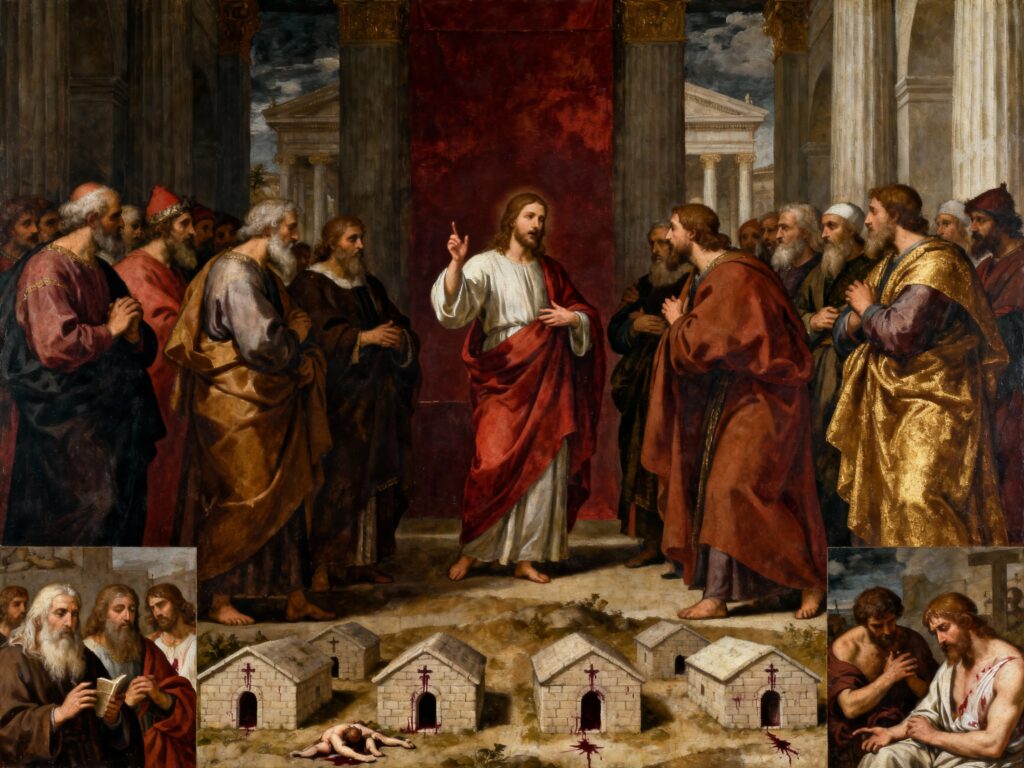
Analysis
Guiding idea: The "key to knowledge" is a living relationship with Christ that gives access to the truth by moving us from closed memory to open memory. The failure described by Jesus has less to do with a lack of knowledge than with a refusal to move on. Biblical knowledge is experience, participation, and loving obedience. It requires receiving the Word as an event that decenters and converts me.
Evidence and springs:
- The ambiguous gesture of tombs: a sign of honor, but also a strategy of control. We admire dead prophets because they no longer challenge our agendas. Jesus reveals the discreet complicity between the cult of the past and present comfort.
- The formula "from Abel to Zechariah": it situates responsibility in a history of solidarity. The generation of Jesus does not "pay" for others in the punitive sense; it answers before God for the way in which it positions itself in the face of the same truth rejected in the past. To refuse today what others refused yesterday is to subscribe to the same logic.
- The connection with Jn 14:6: if Jesus is the "Way", knowledge is walking; if he is the "Truth", knowledge is communion; if he is the "Life", knowledge is fruitfulness. Hence the criticism: to remove the key is to freeze the walking, to isolate the truth as a concept, to sterilize life.
In contrast to a memorial religiosity that immobilizes the prophetic call, the Gospel proposes a paschal memory that allows itself to be traversed by Christ. The key is not brandished to exclude, but offered to enter. It opens the door to a "knowledge" that is verified by the justice rendered to the living today.
Let us now explore three axes to move from the veneration of the prophets to their imitation, by opening the doors of living knowledge.
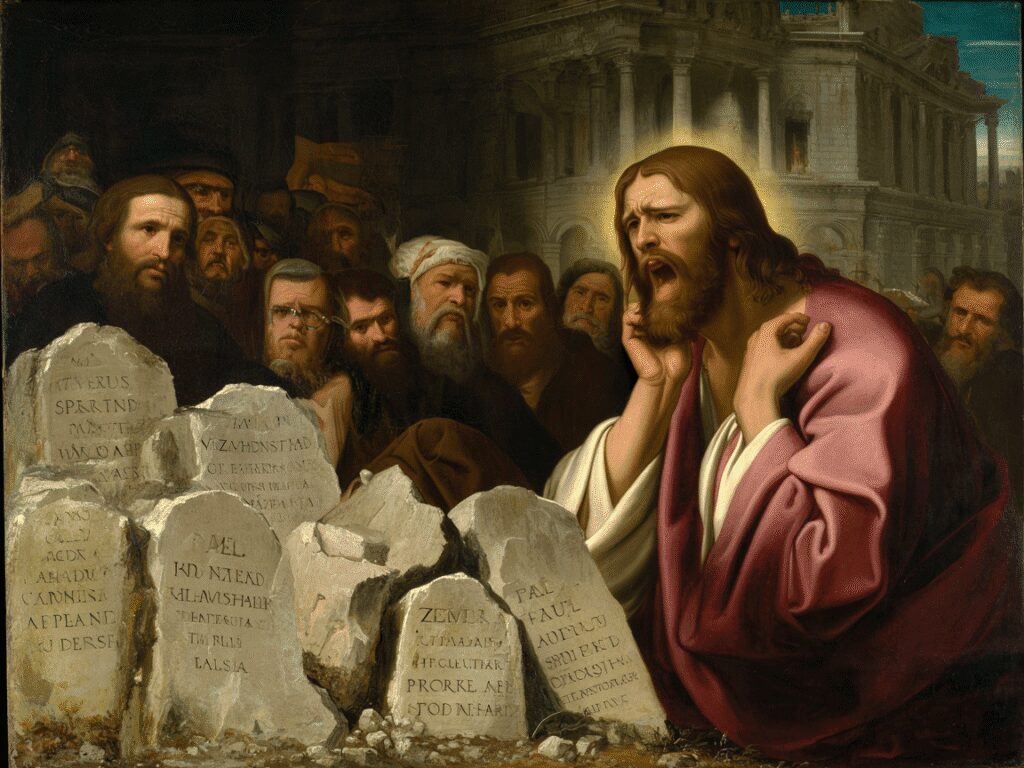
Purifying Memory: From the Blood Chain to the Life Chain
The phrase "from the blood of Abel to the blood of Zechariah" encapsulates a diagnosis: a chain of violence spans generations. Jesus does not invent conflict; he reveals it in order to transfigure it. Purifying memory does not mean erasing the past, but recognizing the mechanisms by which we neutralize God's call. We think of the ecclesial and social "we": how many careful commemorative gestures, yet disconnected from structural conversions?
Evangelical responsibility is both personal and united. Personal, because I am responsible for my way of accepting the truth. United, because my refusals are part of collective dynamics. The Gospel frees us from fatalism: we are not condemned to repeat ourselves. But it rejects amnesia: what is not accepted is repeated, in a different way.
Purifying memory requires three movements:
- Naming the wounds without morbid fascination. Christian memory does not stop at blood; it extends from the Cross to the Resurrection. This is the logic of Easter: recognizing evil without letting it define the horizon.
- Identify our favorite "tombs": frozen traditions, habits that protect our interests, pious slogans. The decisive question: does what we celebrate make us more open to justice and mercy?
- Open ourselves to the active consolation of the Spirit. Purification is not just destroying idols; it is receiving a new heart. Consolation does not remove us from the world; it adjusts us to it.
Easter memory
Commemorate in truth: neither forgetting nor fixation. Let the Spirit connect the wounded past to a future of concrete justice.
The "chain of life" appears when purified memory becomes a source of initiatives: reparation, hospitality, education, reform. Thus, the memory of the prophets is actualized not through mausoleums, but through actions that make the Word credible today. Responsibility is not a burden, it is a grace received for others.
To ensure that this purified memory does not close, a humble hermeneutic key is needed, at the service of everyone's entry.
Rediscovering the Key to Knowledge: Hermeneutic Humility and Spiritual Hospitality
"You have taken away the key to knowledge": the accusation targets a power of interpretation transformed into control. When the key becomes a lock, the institution is protected at the expense of the truth. Finding the key reverses the logic: authority serves access. This key is not a reserved secret, but a path made accessible.
Three traits of a humble hermeneutic:
- Christocentric: The key is a person. Reading, teaching, and deciding "in him" displaces particular interests. The question is not "who is right?" but "who is like Christ?"
- Ecclesial and dialogical: no one enters alone. Knowledge grows through the witness of the saints, the voice of the poor, the intelligence of the faithful, the magisterium and research. Humility opens the door to listening.
- Practice-oriented: An interpretation that does not open a concrete path is not yet Christian. The authentic key unlocks an act: reconciliation, sharing, reform.
Spiritual hospitality is the counterpart of hermeneutical humility. It consists of facilitating the entry of those who "wanted to enter." In our communities, this implies clear pedagogical paths, understandable rites, simple speech without oversimplification, and arrangements where questions can be expressed without fear. The major obstacle is not the demands of the Gospel, but the unnecessary complexity of mediations that serve themselves.
The key as a service
All authority in the Church is tested by this: does it make the Gospel more accessible to the little ones, without watering it down?
Finding the key requires a conversion of language and structures. This does not dilute the truth; it makes it more luminous. For Christian truth is not a fragile object to be defended; it is a life that is given.
Purified memory and humble interpretation converge in an attitude: moving from veneration to imitation of the prophets.
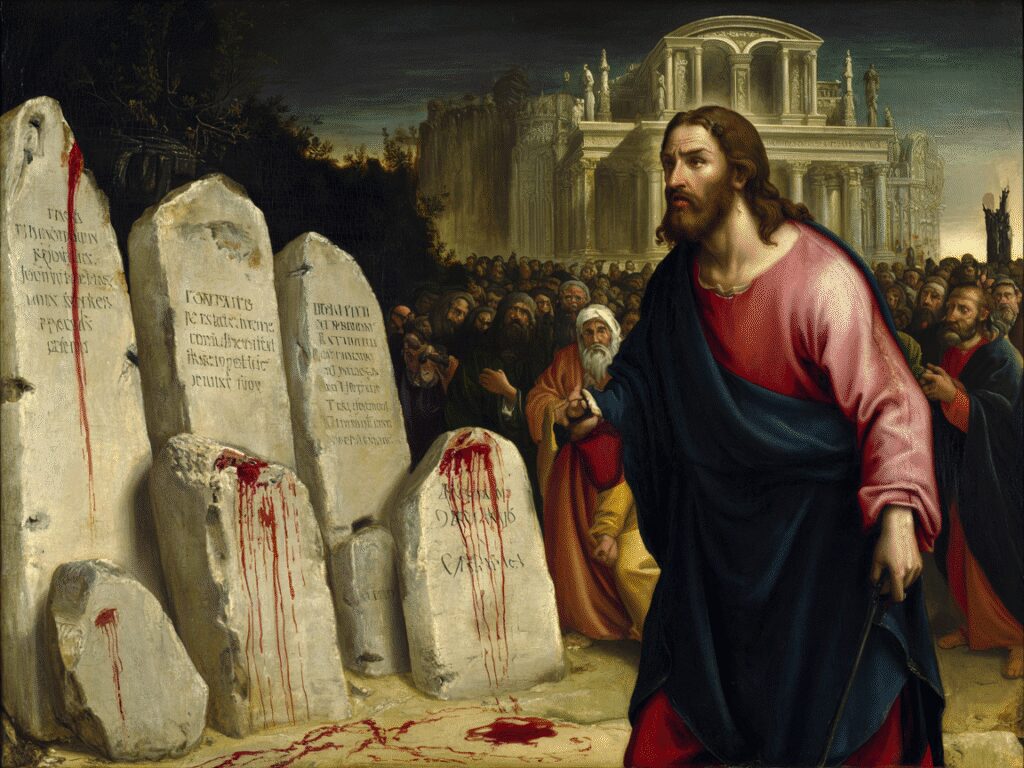
From Veneration to Imitation: Following the Living Prophets
Building tombs can mask a fundamental choice: preferring fixed figures to living callers. Prophets today are not primarily extraordinary figures; they are often the "little ones" through whom God visits us: the poor, migrants, the sick, tenacious educators, courageous mothers, discreet peacemakers. Listening to them means accepting that we are displaced.
Imitating the prophets means learning three gestures:
- Discern: Recognizing God's voice in small voices. This requires prayer, communal listening, and willingness to make concrete commitments (time, finances, reputation).
- Take measured risks: the prophets were persecuted because they affected interests. Christian imitation is not blind recklessness, but prudent courage, based on charity.
- Act with duration: prophecy is not exhausted in flashes of brilliance. It is embodied in just institutions, in alliances, in routines of kindness.
Authenticity Index
A tribute that does not involve any costly acts is probably just another tomb, not an imitation.
Thus Jesus' words become a promise: if you enter, others will enter with you. Knowledge becomes contagious, not through aggressive proselytism, but through the beauty of a balanced life.
Implications in the spheres of life
- Personal Life: Practice a daily examination where I ask: Which "graves" am I honoring without allowing myself to be converted? Perform a concrete act of justice each week.
- Family Life: Tell the family story truthfully, without heroism or denigration. Institute a monthly forgiveness ritual with simple, repeated gestures.
- Work and responsibilities: Check whether our procedures serve the common good or only protect the organization. Simplify one process per quarter to free up time for the department.
- Church life: Rewrite, with lay people and young people, a clear “entry path”: welcome, vocabulary, understandable signs, growth paths, solidarity contribution.
- Citizenship: Transforming commemorations into projects: scholarships, mentoring, workshops. Remembering by working with different partners.
- Training and catechesis: Articulate each content with a practice (prayer, service, social friendship). Knowledge without passage is not yet Christian knowledge.
- Digital Culture: Detect online “tombs” (sterile nostalgia, performative indignation). Prefer communities of practice and real care.
Resonances
Tradition has deeply meditated on these words.
Origen emphasizes that authentic knowledge is an unveiling of the Logos in the heart, not an accumulation of information; the key is interior, given by the Spirit, and opens one to the understanding of the Scriptures to the extent that one converts one's life.
Augustine insists: Scripture is understood only by practicing it. For him, servant authority is the judge of charity: if an interpretation does not build love of God and neighbor, it has missed its target.
John Chrysostom warns against honoring prophets as a way of exonerating oneself. He points out the subtle hypocrisy of "tombs": honoring saints while persecuting their living heirs.
From a Catholic perspective, Dei Verbum (Vatican II) recalls the unity between Scripture, Tradition, and Magisterium, not as three rival powers, but as a single service of the living Word. The "key" is Christ, known in the Spirit, received into the Church.
Jewish tradition, for its part, recognizes the formula "from Abel to Zechariah" as a canonical embrace of the violence suffered by the righteous. It invites us to humility: religious self-justification is a constant danger.
The Catechism of the Catholic Church speaks of the historical responsibility of structures of sin and the need for a conversion of hearts and institutions. Here again, the key to knowledge is verified by justice and mercy.
In the background, the theology of memory (anamnesis) shows that the liturgy does not repeat, it actualizes. Thus, to remember the prophets is to receive today the grace of their courage.
Meditation
- Breathe and name: “Lord Jesus, you are the key that opens my heart.” Breathe slowly, three times, to inhabit this truth.
- To remember in truth: to recall a past event that I honored without imitating. To ask for forgiveness, without condemning myself.
- Listen to the word: calmly reread Luke 11:47-54 and whisper: “Bring me in.” Let a word resonate (key, enter, prophet, blood, life).
- Identify an action: choose a specific gesture of openness (visit, simplification, sharing, call, reconciliation) to take within 48 hours.
- Intercede: Name a person as a “prophet” for me today (poor person, outspoken colleague, child, elder). Pray for them and through them.
- Offer and receive: ask for the grace to be an open door and to find open doors. Note a sign received.
- Give thanks: conclude with a concrete “thank you”: thank you for a light, a resistance unearthed, a desire to enter.
Contemporary challenges
Isn't "generational responsibility" unjust? Answer: The Gospel speaks of joint responsibility, not automatic guilt. We are not judged for the past actions of others, but for how we relate to the same truth today.
Is there not a risk of relativizing doctrine by privileging the "entrance" of all? The key to knowledge does not remove the requirements; it shows the door. Making the Gospel accessible is not to weaken it, but to incarnate it. Pastoral welcome and doctrinal clarity are not opposed; they confirm each other.
How can we distinguish a true prophet from an agitator? Three converging criteria: conformity to Christ, fruits of charity and justice, and proven patience. The prophet does not exploit wounds; he bears them and heals them.
What to do when the institution seems "locked"? Christian fidelity is neither servile nor seditious; it is parrhesia, filial frankness. We can challenge in the Spirit: pray, dialogue, document, propose, create concrete spaces that make the Gospel more accessible, without cutting ourselves off from the body.
What if I myself am the gatekeeper? Good news: authority is a sacrament of access. Conversion is measured by the joy of seeing others enter, progress, even surpass our own measure.
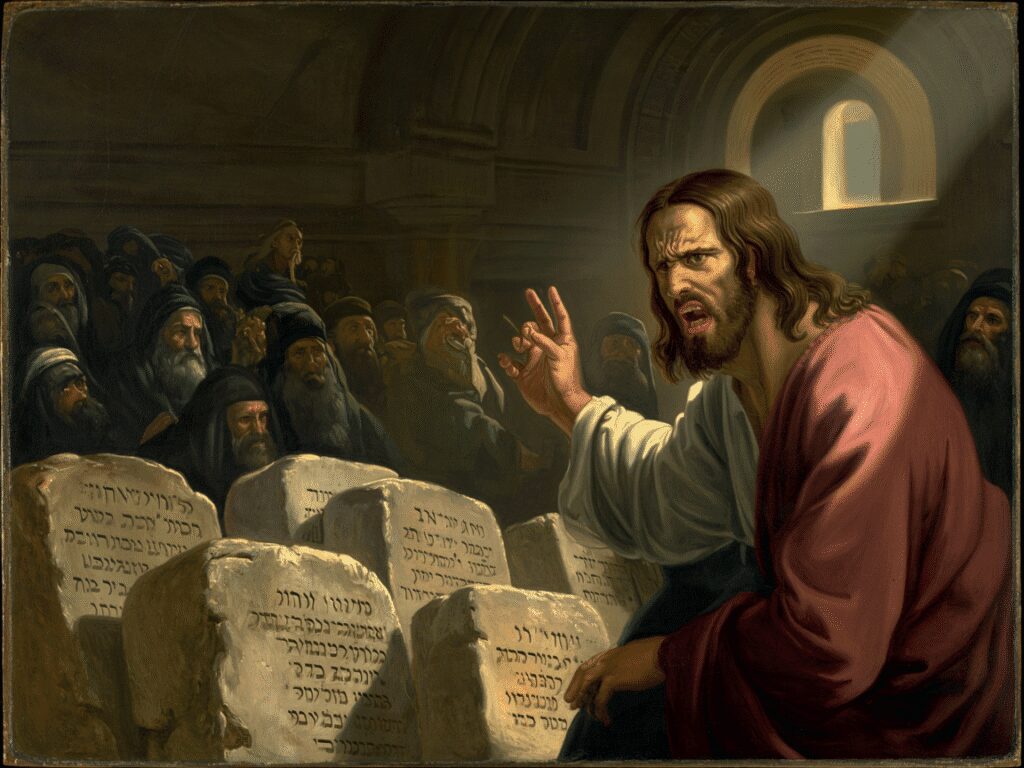
Prayer
Lord Jesus, Key to knowledge, Path of our steps,
You who open without ever closing,
teach us to enter with the little ones, the wounded, the hesitant.
R/ Open our hearts, open our doors.
Father of mercy,
You remember the blood of the righteous
and you make their memory a promise.
Purify the memory of your people,
keep away from us the worship of tombs,
give us the joy of imitating the prophets.
R/ Open our hearts, open our doors.
Holy Spirit, Breath of truth,
lay upon us the gentle and strong key of Christ.
Loosen our tongues, simplify our paths,
make us servants of access,
traveling companions for those who wanted to enter.
R/ Open our hearts, open our doors.
Blessed Trinity,
make our homes hospitable thresholds,
of our assemblies of places of passage,
of our charity school works.
Let the truth be light, not a burden;
that life may abound, stronger than the blood shed.
R/ Open our hearts, open our doors.
We entrust to you the prophets of our time,
those who speak quietly and those who shout,
those who cry and those who hope.
Keep them in peace,
and make us faithful witnesses,
until the day we enter together
in the joy of your Kingdom. Amen.
Conclusion
Jesus' words unlock a passage: from memory that immobilizes to knowledge that sets in motion. The key is not an object to be kept, but a service to be rendered. For each and every one of us, a first step is possible today: to simplify, translate, make accessible, repair, listen, and act. This proves that Christian truth is not an endless debate, but a life received and shared.
May our generation be known, not for the beauty of its tombs, but for the clarity of its doors. Let us enter, and let others enter. This is how Christ—the Way, the Truth, and the Life—becomes the key to our stories, and the blood of the righteous irrigates our decisions instead of haunting them. The promise is within reach: a humble and bold Church, a more just society, enlarged hearts. It is up to us to turn this key.
Practical
- Choose a memory to purify and perform a concrete act of repair or service within 7 days.
- Simplify a text, a rite, a process to make it accessible without distorting it, then test with “small” ones.
- Identify a nearby prophetic voice and actively listen to it; offer concrete and discreet support.
- Establish a clear “entry ritual” in your team: welcome, simple language, journey, regular feedback.
- Reread Luke 11:47-54 every week for a month and note a passage to complete.
- Measuring a piece of fruit: Did someone go further because of you? Adjust accordingly.
- Celebrate a commemoration with a measurable solidarity project, supported by various partners.
References
- Gospel according to Saint Luke, 11, 47-54.
- Gospel according to Saint John, 14, 6.
- Origen, Homilies on Scripture (selection on spiritual knowledge).
- Augustine, De doctrina christiana.
- John Chrysostom, Homilies on the Gospels.
- Second Vatican Council, Dei Verbum.
- Catechism of the Catholic Church (sections on Scripture, charity, responsibility).
- Liturgical and pastoral resources on anamnesis and Christian memory.


